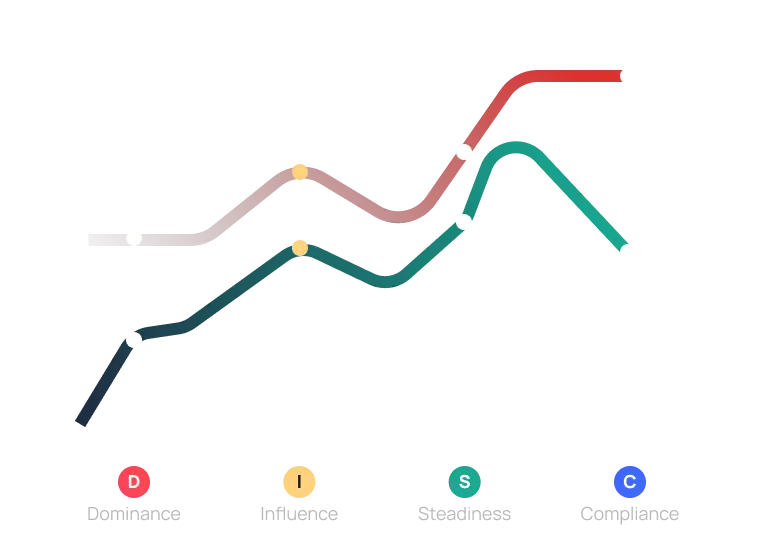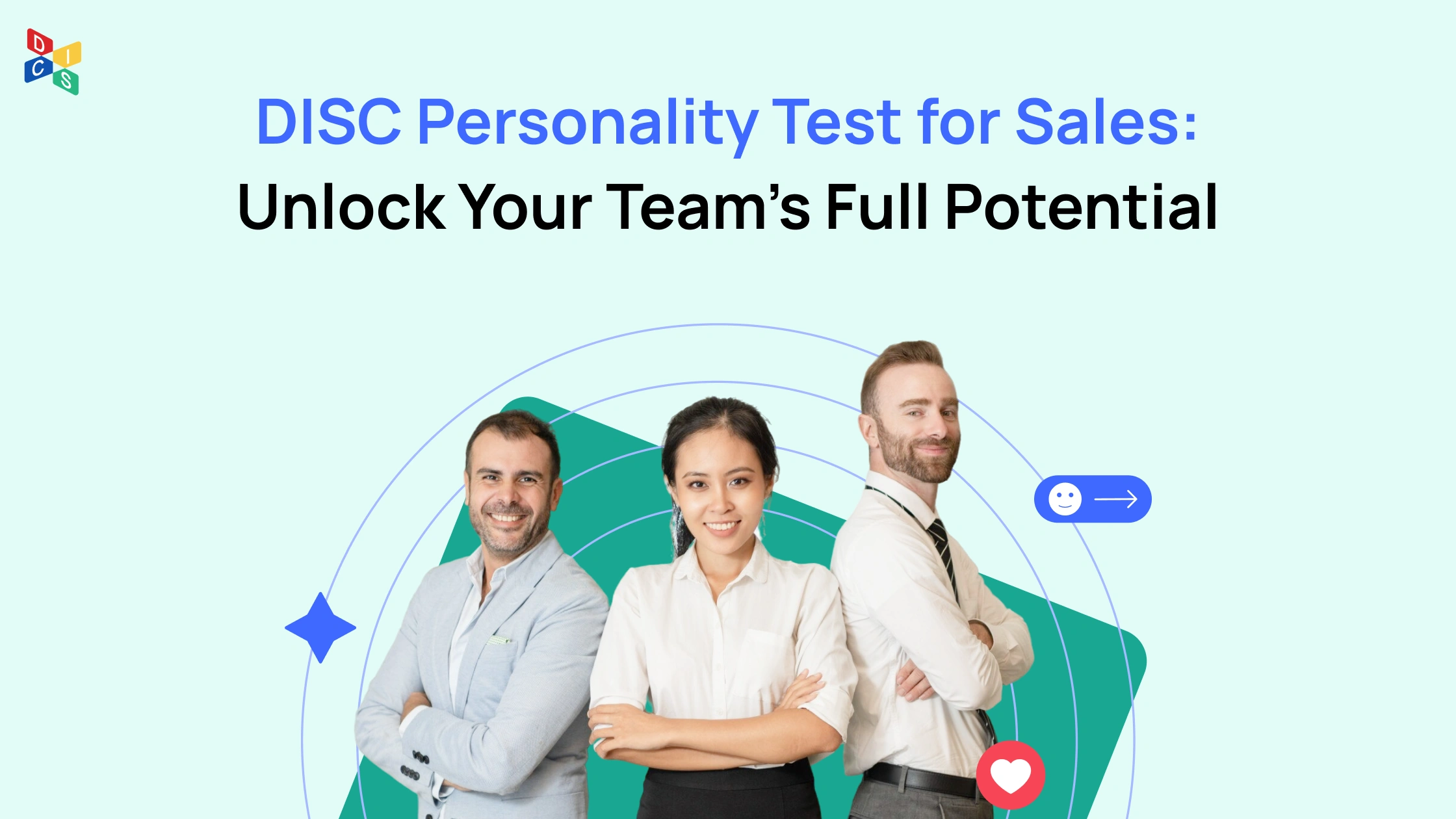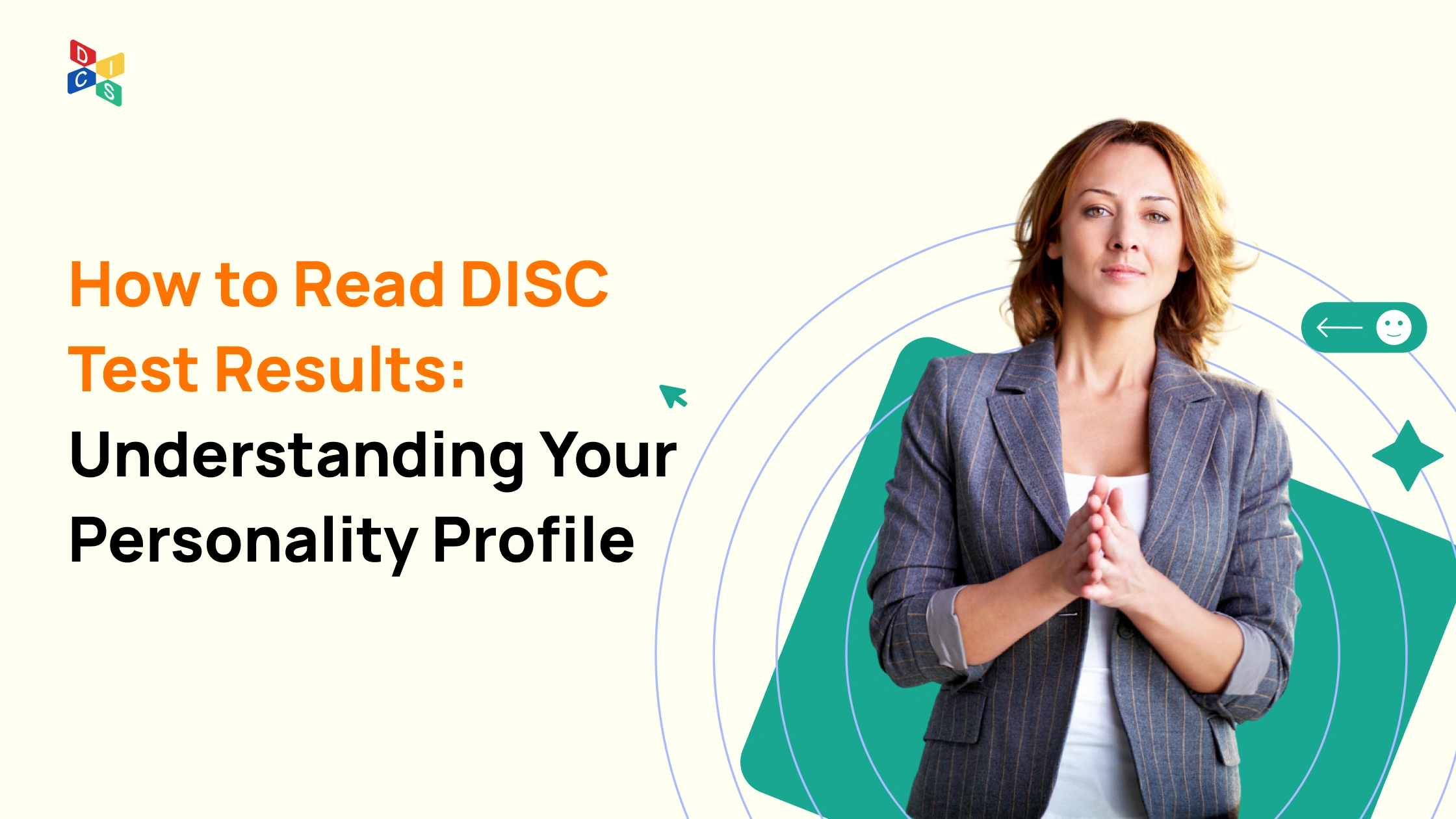Table of content
What Is Disc? All Disc Personality Types Explained
What is DISC? What is a DISC assessment used for? This article will answer all your questions about DISC and how to apply it in career selection.
What is DISC?
DISC is a personal assessment tool designed to understand how individuals react to different situations. Wondering what the DISC test stands for? It’s a simple yet powerful framework for understanding human behavior. Developed by the psychologist William Moulton Marston in 1928, DISC personality profile includes four main personality types —Dominance (D), Influence (I), Steadiness (S), and Conscientiousness (C). This assessment tool sets a foundation for exploring traits, attributes and preferences. Once you complete the test, you’ll receive a personalized DISC assessment profile showing your dominant style and how it influences your interactions.
4 Personality Types in DISC
When someone asks, "What is DISC?", they're asking how people differ in communication and motivation styles. If you've ever been curious about your zodiac sign, you will want to know your DISC personality test type too. Are you dominant or more gentle?
Each DISC personality type plays a different role, and there can be overlaps between two types. Don’t worry if your result doesn’t fit into just one group. The important thing is identifying your key traits. The DISC test explained below will help you understand more about DISC personality analysis.

D Type (Dominance) – The Leader
Distinct Traits: People in this group have a quick mind and get very proactive at work. They are ready to push their limits to reach new values. They are the typical extroverts who are ready to push their limits to reach new values.
Career: D personality types usually take the lead because of the ability to think fast. A leadership DISC assessment helps current and aspiring leaders understand leadership roles, project management, or positions requiring decisiveness.
Interpersonal relationships: Dominant individuals prefer colleagues who match their pace. Indecisive individuals, on the other hand, are difficult to work with. People with high dominance tend to be straightforward but can sometimes come across as rigid.
Favorite quote: "Focus intensely, push forward relentlessly."
I Type (Influence) – The Influencer
Distinct traits: People in this group are social butterflies with optimism. They are positive, open and experimental with new ideas. Besides, they are often involved in creative and artistic activities.
Career: I-type people can use their eloquence and creativity to offer realistic values. So, they can be well-suited for roles like advertisers, speakers or mentors.
Interpersonal relationships: They get on well with people and create a positive atmosphere. Yet, they may struggle to stay disciplined and manage the details of their work.
Favorite quote: "Give it your all, live life to the fullest."
S Type (Steadiness) – The Steady One
Distinct Traits: People in the S group are calm, composed, and mature. They prefer to observe and listen before making conclusions. They are well-planned, reliable, but quiet, risk-averse, and uncomfortable in large crowds.
Career: Steady people are cut out for jobs that provide stability. Counselors, teachers, or healthcare workers might be their career destination.
Interpersonal relationships: S-type people are down to earth and value security. Thus, they might struggle with rapid changes or high-pressure situations.
Favorite quote: "Work with heart, think with vision."
C Type (Compliance) – The Disciplined One
Distinct traits: People in the C group tend to be detail-oriented, cautious and logical. They are perfectionists that see errors in many projects. C-type people are men of action, so they focus more on their tasks and speak less than other types. Because of that, they might come across as distant and difficult to speak to.
Career: People in the C group love accuracy. Thus, they are well-suited for roles in technical fields, analysis and research. Engineers, scientists, or accountants are popular jobs among people of this type.
Interpersonal relationships: These people are action-oriented and only speak when necessary. So, they may face challenges expressing themselves, often being viewed as cold at work.
Favorite quote: "Diligence and persistence, everything will be achieved."
How Does the DISC Test Work?
The DISC test takes 5-10 minutes and asks participants to answer various questions. You will choose the answers that best match you and the ones that do not resonate much from behavior description groups. Afterward, you will receive a DISC chart. This chart analyzes your personality traits in detail, helping you understand yourself better and improve relationships at work and in life.

The Difference Between DISC and MBTI
There are many questions about which personality assessment is the best. To answer that, we must first address a bigger question: "Which test best suits your needs?”
Both the DISC personality test and MBTI are widely respected career assessment tools used by individuals, organizations, and corporations worldwide. However, there are some key differences between DISC and MBTI:
- The DISC test is shorter than MBTI (typically 20-30 questions for DISC, compared to up to 90 questions for most MBTI tests).
- MBTI classifies individuals into 16 personality types, while DISC focuses mainly on 4 dominant personality types: Dominance, Influence, Steadiness, and Conscientiousness.
- MBTI assumes that personality is fixed and unlikely to change, while DISC is more open to the idea that different situations and environments can lead to varying personality traits in an individual.
- MBTI primarily serves as an indicator of a person’s internal thoughts, while DISC is designed to measure how personality translates into external behavior.
Why Take the DISC Test for Career Choices?
The DISC behavioral assessment is an effective tool for assessing individuals and teams, helping to identify personality traits through their behaviors. Understanding “ what is DISC?” helps individuals unlock their strengths and work better with others. DISC hiring assessment is widely used in various fields, including:
Career Counseling and Guidance
Know yourself and know others, and you will win every battle." Sun Tzu's wisdom is no accident, and successful people possess this level of insight. The key is understanding yourself. DISC is a solution that helps you understand who you are and find the best "ocean" to freely "swim."
A study from the Journal of Career Assessment showed that individuals using DISC in career guidance are 30% more likely to choose the right career path compared to those who don’t.
Recruitment and Human Resources Management
According to a report from the Society for Human Resource Management (SHRM), using personality assessment tools like DISC can reduce unsuccessful hiring rates by up to 50%. DISC helps recruiters identify and select candidates who align with the company’s culture and job requirements.
Training and Development
Managers often ask, "What is DISC?" when trying to improve team communication. DISC provides valuable insights to design personalized training programs. A Gallup study shows that employees who receive training based on their personality are 21% more satisfied with their jobs and see a 17% increase in performance.Before assigning roles, it’s helpful to understand “ what is DISC?” and how each type interacts in a team setting.
Determine Your Career Path Based on DISC Personality Types
Each personality type has different career goals. Below are some career suggestions based on DISC, brought to you by discpersonalities.com. Let’s explore them together!
D Group: The Dominant People
People in the D personality group are typically initiators who are ready to take risks. They tend to focus on the "big picture" and identify key steps to take. From there, they break down daily tasks to carry out effectively.

People in the D group focus on task completion and thrive in fast-paced environments. They are often strong-willed and can be impatient.
Career options for D group include:
- Entrepreneurs
- Lawyers
- Police officers
- CEOs
- Stock brokers
DC Group: The Assertive and Committed People
The DC group combines both the D group's dominance and the C group's commitment. They push through challenges accurately to achieve their goals. These people succeed when encouraged and motivated by others.
Careers suitable for the DC group include:
- Architects
- Lawyers
- Operations Managers
- Project Managers
DI Group: The Dominant and Influential People
People in the DI group are enthusiastic and prioritize task completion. They bring creative perspectives and innovate work environments, always seeking new ideas.
Careers suitable for the DI group include:
- Art Directors
- Journalists
- Marketing Directors
- Sales Representatives
I Group: The Influencers
I personality types are dynamic and sociable. They have excellent social skills due to their extroverted nature and prefer work environments that involve interacting with others.

Careers suitable for the I group include:
- Public Relations Directors
- Brokers
- Designers
ID Group: The Influential and Powerful People
People in the ID group work with passion. They excel when given the freedom to make decisions and are willing to take risks. They enjoy remote work, hybrid models, or jobs that involve a lot of travel, like market research.
Careers suitable for the ID group include:
- HR
- Talent Acquisition Managers
- Field Sales
- Writers
IS Group: The Influential and Steady People
People in the IS group know how to listen and empathize. They value harmony and want things to go smoothly. They inspire others to grow and enjoy building relationships.
Careers suitable for the IS group include:
- Personal Trainers
- Consultants
- Community Organizers
S Group: The Steady People
S types act as the bridge between management and colleagues due to their sincerity and reliability. They are good at analyzing and listening, making them strong communicators.

They struggle with anger, negative feedback, and performing poorly in emotionally dependent environments. They thrive in slow-paced, stable work environments.
Careers suitable for the S group include:
- Nurses
- HR Managers
- Counselors
- Therapists
SI Group: The Steady and Influential People
The SI group excels at helping team members work more effectively. They are empathetic listeners and care about others’ emotions. They thrive when working independently.
Careers suitable for the SI group include:
- Advisors
- HR Managers
- Teachers
- Therapists
SC Group: The Steady and Compliant People
People in the SC group prioritize completing tasks. They enjoy planning, creating rules, and processes. They tend to be less outgoing compared to other personality types.
Careers suitable for the SC group include:
- Pharmacists
- Accountants
- Copywriters
- Data Analysts
C Group: The Compliant People
People in the C group prioritize accuracy and perfection when working. They are perfectionists, think logically, are less influenced by emotions, and have strong concentration.

Careers suitable for the C group include:
- Accountants
- Software Engineers
- Scientists
- Economists
CD Group: The Compliant and Dominant People
People in the CD group are detail-oriented, highly organized, and decisive in their work.
Careers suitable for the CD group include:
- Architects
- Business Strategy Consultants
- CFOs
- System Administrators
CS Group: The Compliant and Steady People
The CS group is reliable, responsible, and passionate. However, they can be shy when it comes to speaking up.
Careers suitable for the CS group include:
- Database Administrators
- IT Directors
- Air Traffic Controllers
- Scientists
| Discover More: Which DISC Personality Type Are You? |
After discovering the fascinating aspects of DISC and imagining the career paths that fit each personality type, are you ready to take the free DISC test to explore your personality? Check out the top 4 trusted sources for DISC assessments below!
Conclusion
The DISC personality test is a powerful tool that helps you explore and understand yourself better, guiding you toward effective career development.
To start any journey, one must have clear goals and a destination. Through the “what is DISC test” explanation, discpersonalities.com will accompany you on your first steps, helping you stay on the right path toward your goals. Follow us to learn more about DISC and how it can help you achieve success.
You can also explore other popular tests, such as:
FAQs
What is the purpose of the DISC test?
The DISC test is designed to help individuals:
- Discover their strengths and challenges
- Improve communication
- Enhance teamwork
- Make more informed career or relationship choices
Is DISC scientifically valid?
DISC is widely used in personal development and business contexts, especially for coaching, hiring, and team dynamics. While it's not a clinical diagnostic tool like the MBTI or Big Five, it's valued for its practical application in communication and behavior insights.
Can I have more than one DISC trait?
Yes. Most people are a combination of two or more DISC styles, with one dominant trait and secondary traits that influence their behavior in different contexts.
Who should take the DISC assessment?
- Students choosing career paths
- Professionals seeking self-awareness
- Managers looking to improve team collaboration
- HR teams hiring or coaching employees


Don't Let Your Potential Stay Hidden!
Take the DISC test today and discover your unique 'YOU', with deep insights into your true personality and potential.

Represents your instinctive behaviors and desires.
Shows the behavioral tendencies you think you should exhibit in specific situations.
Related articles
You may also be interested in
 DISCJan 06, 2026
DISCJan 06, 2026DISC Personality Test for Sales: Unlock Your Team’s Full Potential
DISC Personality Test for Sales helps sales teams improve role fit and performance. Learn how DISC boosts hiring, coaching, and customer alignment.
 DISCJan 06, 2026
DISCJan 06, 2026How to Read DISC Test Results: Understanding Your Personality Profile
Learn how to read DISC test results and understand your personality profile. Discover how DISC can enhance communication, teamwork, and career growth.
 DISCDec 31, 2025
DISCDec 31, 2025What Is Group Culture? How Team Behaviors Shape Workplace Success
Discover what is group culture and how it shapes team dynamics, decision-making, and performance. Learn how the DISC model can help improve your team’s culture.
